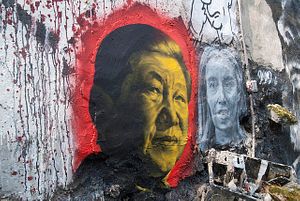After plenty of ambiguity, we’ve now heard confirmation from both Islamabad and Beijing that Chinese President Xi Jinping will indeed be traveling to Pakistan next week for a long-awaited state visit. The visit was originally supposed to take place last fall, when Xi toured South Asia (visiting India, Sri Lanka, and the Maldives), but was postponed amid nationwide anti-government protests in Pakistan. Xi’s visit to Pakistan will last two days and then he will head to Indonesia to attend the Asian-African Summit and commemorate the 60th anniversary of the Bandung Conference.
The agenda for Xi’s meetings with Pakistan’s top leadership — including Prime Minister Nawaz Sharif, President Mamnoon Hussain, and possibly Pakistan’s Chief of Army Staff Raheel Sharif (no relation to the prime minister) — will be packed. What we know about the impending visit’s agenda primarily comes from the Pakistani side — the Chinese foreign ministry and state media have been relatively muted about the visit, only officially announcing it on Friday. Pakistan, meanwhile, has spread word that the crown jewel of Xi’s visit to Pakistan this year will be a series of agreements on financing Pakistani infrastructure projects, in energy, transportation, and communications. Pakistani officials estimate that China will commit $46 billion to the China-Pakistan Economic Corridor (the name for this collection of projects). China’s former ambassador to Pakistan recently corroborated these reports to Xinhua, noting that “the China-Pakistan Economic Corridor (CPEC) will be high on the agenda” during Xi’s visit.
The logic of China making a major infrastructure investment in Pakistan certainly makes plenty of sense. The China-Pakistan Economic Corridor would connect the Chinese-financed port city of Gwadar on Pakistan’s southern coast with the trans-Himalayan Karakoram highway, which connects western China to northern Pakistan. In theory, improved infrastructure along this corridor would help the transit of goods and services from the Arabian Sea and the Indian Ocean to China. According to some reports, China may consider financing some of the later projects through the newly established Asian Infrastructure Investment Bank (AIIB) and the Silk Road Fund.
In Xi Jinping’s “One Belt, One Road” initiative, Pakistan will come to play a central role given its position at the nexus of South and Central Asia, with the Arabian peninsula in close proximity off its southern coast. China’s plans for a land-based Silk Road Economic belt and a sea-based Maritime Silk Road will rely on a functional China-Pakistan Economic Corridor. As a Chinese Foreign Ministry spokesman put it, the China-Pakistan Economic Corridor is “a flagship project of the ‘Belt and Road’ initiative.” In order to realize this Corridor, China and Pakistan are expected to sign agreements on 32 projects, according to one report in Pakistan’s Business Recorder. Sixteen of these projects will focus on energy, five will focus on Gwadar, and four on transportation and infrastructure.
Furthermore, one of the major agreements, which the Wall Street Journal scooped and I discussed in greater detail last week, will be a deal to have China finance a majority of Pakistan’s work on the Iran-Pakistan natural gas pipeline. The completed pipeline will deliver natural gas from Iran’s South Pars field to southern Pakistan — a coup for energy-starved Pakistan.
China and Pakistan, long self-described “all-weather partners,” have a range of non-economic issues to discuss as well. During Xi’s time in power, China’s persistent problem with Uyghur separatists in the country’s restive western province has grown worse. China knows that Uyghur separatist groups, including the East Turkestan Islamic Movement, use Pakistani territory as an area to plan and train for eventual terrorist attacks that claim Chinese lives. Xi will undoubtedly be briefed on Pakistan’s ongoing campaign against its homegrown terror problem. Xi will likely praise Pakistan’s progress on Operation Zarb-e-Azb, the Pakistani military’s massive campaign against extremist militants in the country’s tribal regions.
On military cooperation, the big-ticket item we’ll be waiting for news on is the recent announcement that China is likely to sell Pakistan eight conventional submarines — a deal that, if concluded, would double Pakistan’s submarine fleet. Details on which submarines and their price remain unknown (though don’t be surprised if it’s the Type 041 Yuan-class). Additionally, Xi and Pakistan’s top brass will likely discuss progress on the joint Sino-Pakistani JF-17 lightweight multi-role fighter — specifically, the issue of why it’s having a tough time on the global fighter market.
On Monday, Xi will address a joint session of Pakistan’s parliament, likely his most public opportunity for a statement on the future of the China-Pakistan relationship during the entire state visit. If Pakistani reports are true and Xi does depart for Indonesia having left behind assurances of$46 billion in Chinese financing and grants for Pakistani projects, the development would be nothing short of a sorely needed miracle for Pakistan, which endures major deficiencies in its energy and transportation infrastructure.

































